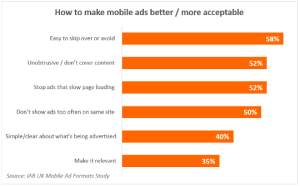IAB UK Study Calls for Common Sense in Tackling Mobile Ad Blocking
by Lindsay Rowntree on 29th Jun 2016 in News


The Internet Advertising Bureau (IAB) UK have released results of a major consumer study to understand consumer perception of mobile advertising. In response to the results, IAB UK have assigned superhero personas to acceptable advertising formats in an attempt to help advertisers choose consumer-friendly mobile formats, but will it be considered to be a patronising endeavour by the industry?
The study, conducted by Differentology, used a mixture of online surveys, consumer diaries and in-depth interviews to understand what consumers really think about mobile ads, so marketers can produce better mobile campaigns and reduce ad blocking. According to the IAB UK press release issued today, the study revealed 10% of people currently block mobile ads – millennials accounting for 63% of this group.
The study revealed that 78% of respondents can’t stand ads that take over the whole screen. Nearly six-in-10 (58%) consumers identified a clear 'X' button or a 'skip ad' function as the best way to make ads more acceptable. Over half (52%) cited making ads less obtrusive in terms of how much content they cover as a way to make ads more acceptable – the same number who cited stopping ads that cause slow page loading.
 “Almost four in five consumers accept that ads fund free internet content,” said Mike Reynolds, mobile and video manager, IAB UK, “but they need to feel in control, particularly on mobile, and ad blocking is the way to gain control.”
“Almost four in five consumers accept that ads fund free internet content,” said Mike Reynolds, mobile and video manager, IAB UK, “but they need to feel in control, particularly on mobile, and ad blocking is the way to gain control.”
Following the results of the consumer study, IAB UK reveal some golden rules; a list of key do’s and don’ts for marketers to maximise campaign success and minimise the risks of ad blocking:
Do’s: Keep ads simple, fun, short. Less frequent. Be creative. Be relevant.
Don’ts: Hijack or take-over the user experience. Omit x/skip button. Go straight to app store/other sites. Overload by frequency. Overload amount of data/ad size.
Reynolds notes that there is a delicate balance to getting mobile ads right: “Even consumers have mixed feelings about what they like”. He uses the example of how ads with a higher impact can be more annoying for the consumer, but relevant location or behavior-based ads could be welcomed, yet raise privacy concerns.
To ensure the results of the study are taken on board and actioned, IAB UK have assigned a superhero persona to each of the six main mobile ad formats which were featured in the study, to help advertisers deploy the best ones, depending on their individual campaign parameters, as well as releasing a film trailer-style video:
Standard Banner: “The Soldier” – Simple. Reliable. Well-liked. Never outstanding or exciting. Favoured by older and lighter users
Rich Media Banner: “The Star” – Everyone’s favourite. Engaging. Creative. Choice to pass or engage fully
Pre-Roll Video: “New Kid on the Block” – Interruptive. Engaging. Creative. Liked by Millennials
In-Read: “Team Jester” - Interruptive. Preferred by younger audience. Very engaging, especially with short-form content (social)
MPU: “Loyal Help” - Accepted by consumers. Not as engaging. Easy to miss
Interstitial: “Reckless Hero” - Extremely engaging. Communicative. Can be annoying. Present a clear exit
According to Reynolds, “it’s about understanding what consumers really want from mobile advertising and, consequently, knowing which format, or hero, to call on.” He concludes that, “each format has a role to play and using a mix of high impact ads alongside standard ones, such as MPUs, will ensure you grab consumer attention without annoying them. This improves the ad experience, resulting in more effective campaigns and less reasons to block ads.”
Given how long the ad blocking war has been raging, it seems worrying that it has taken so long for such a study to be conducted. It also seems obvious. Wouldn’t it be logical that mobile consumers don’t like intrusive ads and that they want to be able to see a clear ‘escape route’ from the ad? It’s a fair argument, but given that these ad formats continue to reign supreme and consumers continue to install mobile ad blockers, maybe the industry needs a not-so-subtle reminder.
Many advertisers may find the IAB UK’s approach patronising – do they need a superhero cartoon to tell them how to effectively advertise on mobile? Most advertisers won’t think so, but there is clearly a need for some form of action to be taken and the IAB’s response to the study, whether right, wrong or patronising, should at least elicit some form of response. Even if the approach receives some negative press from the industry, at the very least it becomes a talking point and like the most annoying TV adverts, will become entrenched in the mind of the advertiser.
The IAB UK is calling for ‘common sense’. Most will find their approach unnecessary and potentially insulting, as the industry shouldn’t need dumbed down communication and be told to use their common sense – it should prevail when it comes to understanding the mobile consumer. Well, it doesn’t seem to have so far.
Ad BlockingAdvertiserMobileRegulation








Follow ExchangeWire